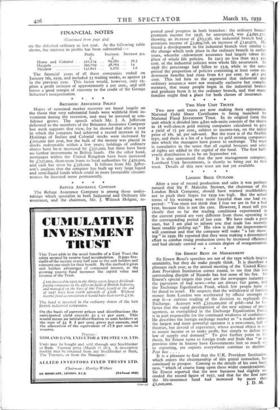SIR ERNEST BENN ON MANAGEMENT Sir Ernest Benn's speeches are
not of the type which insph unanimity, but they do make people think. It is therefore pleasure each year, as the annual meeting of the United King- dom Provident Institution comes round, to see that this last outstanding disciple of Ricardo has lost none of his fire. Sir Ernest's special targets this year arc the newspaper industry— the purveyors of bad news—who are always fair game, and the Exchange Equalisation Fund, which few people have so far dared to assail. He suspects that the withdrawal of foreign money from London was accelerated by official attempts to stop it—a curious reading of the decision to replenish t.N Exchange. Account with £35o,000,000 of gold—and he be- lieves that the rapid development of the new science of mal- agement, as exemplified in the Exchange Equalisation Funk;. is in part responsible for the continued weakness of confidence He describes the foreign exchange market as "a market wher the largest and most powerful operator is a newcomer, full ( theories, but devoid of experience, whose avowed object is nc to secure income or to make profit, but simply to defeat th.: law of supply and demand." To give further point to thesis, Sir Ernest turns to foreign trade and finds that "at n, previous time in history have Governments lent so much ai,' to exporting, yet exports everywhere continue to decline.
Post hoc . . . .
It is a pleasure to find that the U.K. Provident Institution. which enjoys the chairmanship of this genial iconoclast, has continued to prosper. Coming to the details of his own busi- ness, "which of course hang upon these wider considerations, Sir Ernest reported that the new business had slightly ex- ceeded the record figure of 1937, and that for the first time the life-insurance fund had increased by more than










































 Previous page
Previous page